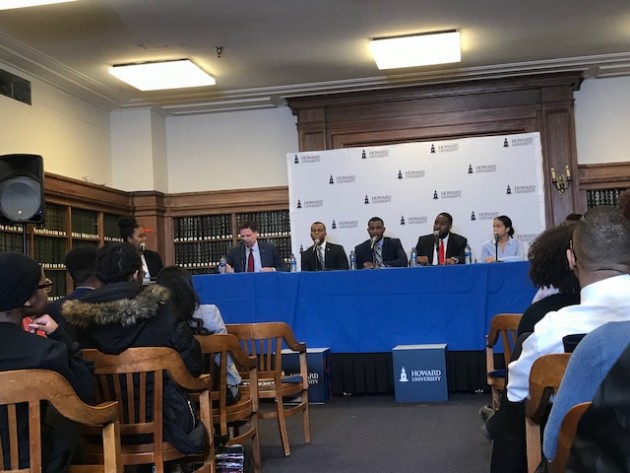It was a conversation between two old friends, a musician who happens to be a world famous jazz trumpeter and a writer, a literary editor of The New Republic magazine. The fact that their conversation happened to be in front of a large audience at the Sixth and I Synagogue was deliberate but of no consequence to Wynton Marsalis or Leon Wieseltier.
Wieseltier began the discussion by announcing that the conversation on Monday night entitled “Where Y’all At?: Jazz, Race, and Culture” was going to be a talk about America.
The inspiration for the title was the last track on Marsalis’ latest recording, “From the Plantation to the Penitentiary.” In the track, Wieseltier said, “Marsalis emerges as a preacher…. [Raising] real interesting points…music as a social criticism.”
The two men sat in cushioned wooden chairs on stage with coffee mugs placed in front of them. They showed the people watching them how friendship ripens into a sweet wine with age and form.
The first topic was honesty and how it can bring trouble your way when you’re sincere about controversial issues, like the scarcity of real musicians or the way the media encourages young people to adopt degraded values.
Marsalis said old folks in his community at places like the barbershop taught him why honesty matters. “Everybody said what they wanted to say. I was given that impression you said what you wanted to say,” Marsalis said.
Wieseltier told Marsalis that, “When I listen to your record what I hear is the work of a man who simultaneous loves his country but despises certain things.” It turned out that the two men share a love and hate for American aesthetics and that they agreed that American culture has been watered down so immensely by greed for material goods and global supremacy that some vital traditions have been lost.
Jazz music in a sense is a form of media. It has a story to tell through its harmony and form. “The more you know about music the more you know about things,” Marsalis said. Jazz and the Blues are honest. “When people ask me questions I respond to them honestly. The most difficult thing has been to maintain a level of honesty even though you know it may come back at you,” said Marsalis.
Journalists, too, catch heat, Wieseltier said. As a journalist it’s his job to bear the burden of truth. “Your skin can never be thick enough. Ever!”
It became clear that their conversation was never meant to seem like an interview. Wieseltier did not shoot question after question at Marsalis. Instead he gently engaged in coffee shop chit-chat.
Making jokes about old philosophers and opinionated musicians Wieseltier and Marsalis kept the audience engaged by bringing the discussion back to social politics and how Americans had lost their way since the 1930’s, ’40s and ’50s.
Wieseltier said that when Marsalis’ new record came out, “one thing I noticed is you had these very ferocious, intense songs about very real subjects about your country or wealth…. Each song is premised by a formal description.”
The songs are meant to let Americans know they have forgotten what makes them unique—besides warranted freedom, Marsalis said. Black and white Americans alike have failed to see how they no longer own or produce cultural trademarks. Americans have no national dance, style of dress, or music to pass down to our children, he said.
Wieseltier and Marsalis agreed that American music had lost itself in the last 60 years. While Third World countries like Brazil, Argentina, or even Turkey, as Marsalis pointed out, still possess theirs. “The most powerful thing in a piece of music is what the bass and drums do together. When a bass and drum come together they define your music” whether it is samba, New Orleans or salsa, Marsalis said.
The conversation crossed into several aspects of American culture using jazz—or on several instances the blues and classical music— as a base to describe the change in times. Marsalis’ global travels showed him that the Blues is a colorblind dog seeing no race or cultural divide.
“I could tell you story after story about this universal ignorance…. I am not going to lie to you. As I began to travel around the world, I began to see my situation in terrain– Louisiana or Afro American … as just one small situation in the context of the larger situations…You’re just one. So my papers became less a myopic nationalistic backwards view of the music of Afro American experience,” explained Marsalis.
Find more information on Wynton Marsalis: http://www.wyntonmarsalis.com/.


